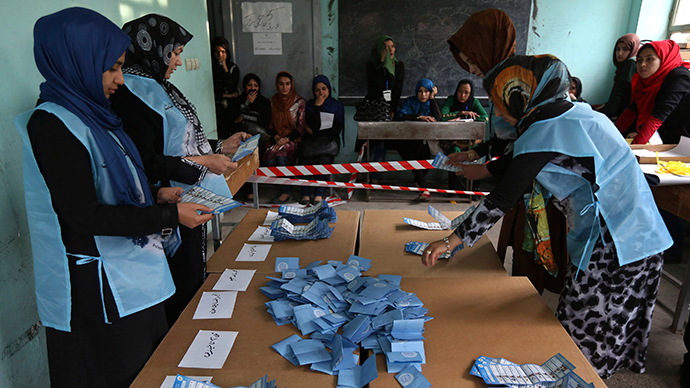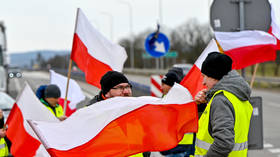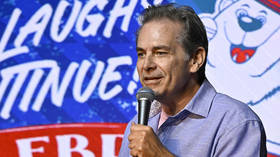‘Transparency is hardly only problem of Afghan elections’

Many things are required to rebuild Afghanistan after so many decades of war and it is far more than any election is going to be able to put into power, Phyllis Bennis, director at the Institute for Policy Studies, told RT.
RT:The Afghans are taking several weeks just to count all the votes. Will such a lengthy process ensure more transparency?
Phyllis Bennis: I don’t think transparency is the biggest problem. There is a huge problem of the nature of the election in the country that is still at war. This is a situation where you have thousands upon thousands of paper ballots that need to be transported across a very contested territory. It is going to take a very long time and transparency is hardly the only problem. There is a big question whether any election in this context of war can be considered free and fair. There were many incidents of violence on the day of the election, but even aside from that the question who was able to run, who was able to campaign, who was able to get to the voting booths and who was not remains a huge problem in Afghanistan.
RT:What are the potential risks for the country if no candidate secures at least 50 percent of the vote and a runoff has to take place?
PB: I think everyone is anticipating that there will not be 50 percent for any candidate. The two most likely candidates, Abdullah Abdullah and Ashraf Ghani, together make up only about 70 percent of the total votes, so it’s almost certain that there will be a runoff. The reality is that for most Afghans, whoever gets elected it’s not going to change their situation very much.
The level of violence is going to continue, the fact that Afghanistan remains the worst country in the world in terms of child mortality, for instance, is not likely to change, and both of the top candidates have made a decision ahead of time that they would be willing to sign on to an agreement with the US to keep the US and NATO troops in the country long after the end of this year. That means that they are going to have to deal with question of immunity what ended the presence of US troops in Iraq when the Iraqi Parliament refused to agree to what the president wanted, which was an agreement to give immunity to the US soldiers. Whether the Afghan government is prepared to do that, we don’t know yet. But that’s one thing that could result in a full withdrawal of the US troops from Afghanistan.
RT:The vote's already been hailed as a success by Western observers but is such optimism really justified?
PB: I think the vote was a success in the sense that many people went to the polls and they voted. So in that sense the form of democracy was carried out. We don’t know yet, we haven’t had the first or the second result yet from the two different committees that have to vet the results for the issues of fraud, vote tempering etc., we haven’t heard that yet. But even if that happens, I think that we have the form but it would be a far-stretched to say that we have the substance of democracy in Afghanistan. This is the country that does not, unlike Iraq, have a long history of a strong central government. For many years President Karzai was known as ‘a major of Kabul’ because his influence is really only extended as far as the borders of the city. So what it is going to take to rebuild Afghanistan after so many decades of war is far more than any election is going to be able to put into power.
RT:Kabul has still not secured a security pact with Washington that would see thousands of American troops remain after the NATO pullout. Is there a chance this pact won't materialize at all?
PB: Right now it looks like it will happen because both of the leading candidates have said they would sign it. The big question is that nobody has been talking about very publicly is whether this agreement will include the guarantee of immunity for all the US troops and war crimes they might commit.

We know from President Obama that his intention in keeping something between 10,000 and 20,000 US troops in Afghanistan after 2014, is that they will not be involved in country insurgency, winning hearts and minds, helping to rebuild the country. They will be there to kill bad guys that means to kill Afghans, people who the US says, somebody told them, is a bad guy. Now whether that leads to the killing of civilians in large numbers as it has for so many years, we can only assume that it will. And if that’s the case whether the Afghan government is prepared to allow those responsible right up the chain of command and including the soldiers on the ground to be immune from being held accountable in Afghanistan’s own judicial system, that’s the big question. That’s what we don’t know yet.
RT:Would Afghan security forces be able to contain the Taliban without foreign assistance? And even with a few thousand American troops helping out would that be enough to hold back the insurgency?
PB: I don’t think we’ve seen a situation even when there were 150,000 US troops in the country. We have not seen a situation where the Afghan military and police were able to ‘keep the Taliban at bay’. This is the situation where the Afghan military is essentially one more militia, it is one that's the biggest and the one backed and armed by the US. But at the end of the day it’s a sectarian based militia accountable to the government that does not have very much support in the country. So that’s going to be a huge problem whether or not there is a small number of the US troops there.
RT:After 12 years of foreign support and billions of dollars in aid, Afghanistan is still one of the most corrupt countries in the world. Will the new president be able to change anything?
PB: This is one of the big questions. Certainly the president has a certain amount of influence within his own cabinet, within his own government, but the culture of corruption in this government is very strong and the notion of the election of one more president is going to somehow change that would be very optimistic.
What we saw with President Karzai, there were not very strong allegations of his involvement personally in corruption, but he certainly surrounded himself with people who tolerated huge levels of corruption in every component of the government. I don’t really see the power of a new president being able to change that any time soon.
RT:Why is the drug business in Afghanistan so developed? Will it possible to resolve this problem with a new president in power?
PB: I think for the same reason the drug businesses flourish in other parts of the world. For many people this is the only way they can make a living, for many people growing poppies it is the only realistic crop they can grow. They have no access to the roads, to transport. Pulling in a pound for some kind of opium is a lot easier to transport than the tons of wheat that you have to grow to make the same amount of money. So all of the questions about undeveloped character of Afghan infrastructure, its poverty, all of those that feed the drug production and the drug trade. Until that changes, I don’t think that any new laws that might be passed are likely to have much impact in the outlying areas of the country where the vast majorities of Afghans live.
The statements, views and opinions expressed in this column are solely those of the author and do not necessarily represent those of RT.
The statements, views and opinions expressed in this column are solely those of the author and do not necessarily represent those of RT.











